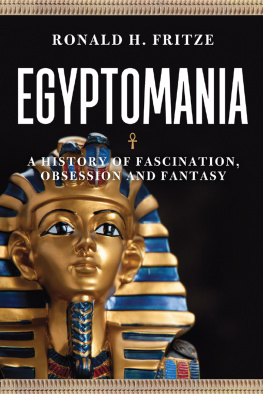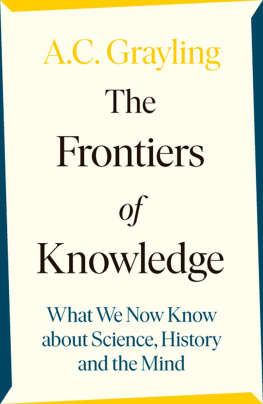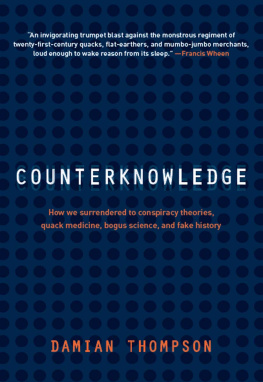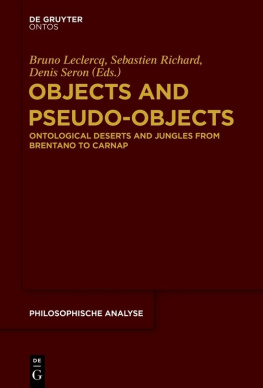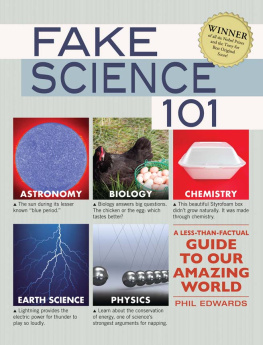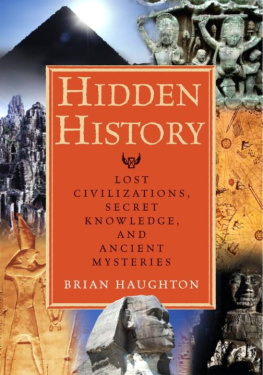Invented
Knowledge
False History, Fake Science and
Pseudo-religions
RONALD H. FRITZE

REAKTION BOOKS
For Jeremy Black
Gentleman, Scholar, Facilitator and Friend
Published by Reaktion Books Ltd
33 Great Sutton Street
London ECIV ODX, UK
www.reaktionbooks.co.uk
Copyright Ronald H. Fritze 2009
All rights reserved
No part of this publication may be reproduced, stored in a retrieval system, or transmitted, in any form or by any means, electronic, mechanical, photocopying, recording or otherwise, without the prior permission of the publishers.
Page references in the Photo Acknowledgements and Index match the printed edition of this book.
Printed and bound CPI Antony Rowe, Chippenham, Wiltshire
British Library Cataloguing in Publication Data
Fritze, Ronald H., 1951
Invented knowledge: false history, fake science and pseudo-religions
1. History Errors, inventions, etc.
2. Common fallacies
3. Conspiracies
4. Geographical myths
5. Fraud in science I. Title
001.96
ISBN : 978 1 86189 430 4
Contents
Introduction
Man is an historical animal with a deep sense of his own past, and if he cannot integrate the past by a history explicit and true, he will integrate it by a history implicit and false.
GEOFFREY BARRACLOUGH (1956)
On 1 December 1862 Abraham Lincoln told the Congress of the United States, Fellow-citizens, we cannot escape history. He was right. The United States was embroiled in its Civil War, the nations greatest crisis and its deadliest war. Every day Lincoln and his congressional colleagues experienced history and made history. He could say the same thing to the entire population of this world of ours if he could talk across the ages. We too live and make history every day. Sadly, Lincoln could just as well have said, Fellow-citizens, we cannot escape pseudohistory. Pseudohistorical conspiracy theories had helped to bring on the war he was fighting. In the Northern states a widespread belief in the existence of the Slave Power Conspiracy caused people to fear that Southern slaveholders were plotting to destroy civil liberties and enslave poor whites. In the South many people believed that Northern Republicans were conspiring with radical abolitionists to foment a massive slave uprising that would end with barbaric slaves murdering hapless whites in their beds or worse. Both of these pseudohistorical misperceptions helped to fuel the fires of war.
The epoch of antebellum and Civil War America gave rise to a spate of pseudohistory, a sign that unprecedented physical uncertainty about the outcome of widespread political and military conflict was spilling over into the intellectual climate of the age. Americans began to reappraise the history of their tormented land, a reappraisal ripe for wild speculation stretching back into time. Consider the myth of the mound-builders of prehistoric America. According to this myth, a lost white race had settled North America in ancient times and built a glorious civilization whose sole remains were the many mounds scattered across the eastern United States. Tragically the savage ancestors of the Red Indians (Native Americans) invaded the land of the white men and destroyed the mound-builders. The wilderness reclaimed the land. This mound-builder myth is widely thought to have contributed to inspiring a new religion, the Church of Jesus Christ of the Latter-Day Saints, whose members are better known as the Mormons. If so, it was not the first or the last religion inspired by pseudohistory. The mound-builder myth also provided a convenient justification for the dispossession of the Native Americans from their lands. Other pseudohistorical myths told of Prince Madocs discovery and settlement of America during the Middle Ages and his peoples transformation into the fabled Welsh Indians. Tales of the Ten Lost Tribes of Israel or other ancient Hebrews wandering the Americas were added to the mix (see chapter Two). These are amusing stories at the least, and the large numbers of books on those topics from that era attest to their widespread popularity.
Things have not changed all that much from Lincolns time. We cannot escape pseudohistory or pseudoscience either. The only difference is that today there are more pseudohistorical and pseudoscientific ideas and more media for disseminating those ideas than just books. The delivery system for pseudohistorians and pseudoscientists of all stripes now encompasses a charlatans playground of film, television, radio, magazines and the internet. An especially influential example of the role of media in disseminating pseudohistorical and pseudoscientific ideas is the late night radio show Coast to Coast AM , created and hosted for many years by Art Bell, although most of the hosting is currently done by George Noory. The list of past guests on the shows website contains the names of a good number of people discussed in this book. If this sounds like The Da Vinci Code, that is because it is rooted in the same pseudohistorical sources.
The Da Vinci Code, one of the most successful novels of the new century, was based on a premise derived from pseudohistory. Unlike Bruce Burgess, Dan Brown, the author of The Da Vinci Code, freely admits that his novel is a work of fiction, something many fans of the fiction refuse to accept. Dozens of books appeared to debunk all or parts of the history portrayed in The Da Vinci Code and some manage to combine good scholarship with clear writing. Still they have had little effect on those willing to believe in conspiracy theories about the descendants of Jesus and nefarious activities by the Christian church. Not that Brown has much reason to feel aggrieved about any of that. His legion of eager fans have helped to make The Da Vinci Code a huge bestseller with well over 60 million copies sold. The people who did feel aggrieved were Michael Baigent, Richard Leigh and Henry Lincoln, authors of The Holy Blood and the Holy Grail (1982), a book that claims the marriage of Jesus Christ and Mary Magdalene and the survival of their bloodline is historical fact. Brown clearly got his premise for The Da Vinci Code from The Holy Blood and the Holy Grail and that did not sit well with Baigent and Leigh. In March 2006 they filed a copyright infringement suit in Britain against Browns publisher Random House. The judge found against Baigent and Leigh because they stated that The Holy Blood and the Holy Grail was non-fiction, a statement many professional scholars would have disputed. Because writers of fiction frequently borrow from non-fiction works for background, Baigent and Leighs claim of copyright infringement was invalid. They appealed but lost again and found themselves facing legal bills for 3 million ($6 million). Clearly there is big money in pseudohistory
Pseudohistory and pseudoscience are not just represented by blockbuster films and bestselling books. The shelves of new and used bookstores are laden with many less successful works of pseudohistory, particularly in the New Age or Occult sections. Some titles manage to make their way into the history sections. Meanwhile the magazine racks display copies of pseudohistorical magazines like Atlantis Rising, World Explorer/Adventures Unlimited and Ancient American in cosy but incongruous proximity to the venerable Archaeology magazine and debunking periodicals like Skeptic and Skeptical Inquirer. A recent Scholars Bookshelf catalogue lists a new book, The End of Eden: The Comet that Changed Civilization by Graham Phillips, which claims that around 1500 BC the comet 12 P /Pans-Brooks made a close approach to the earth. The earth passed through the comets tail and that resulted in a chemical entering the earths atmosphere. An outbreak of warlike behaviour and monotheism occurred soon after. The aggression was caused by the chemical, the monotheism by the awesome spectacle of the comet in the sky. The late pseudohistorian Immanuel Velikovsky must be happy that someone has paid him the compliment of imitating his hypotheses: either that, or fretting that a copyright infringement suit cannot be filed from the great beyond. Another Scholars Bookshelf catalogue offers


